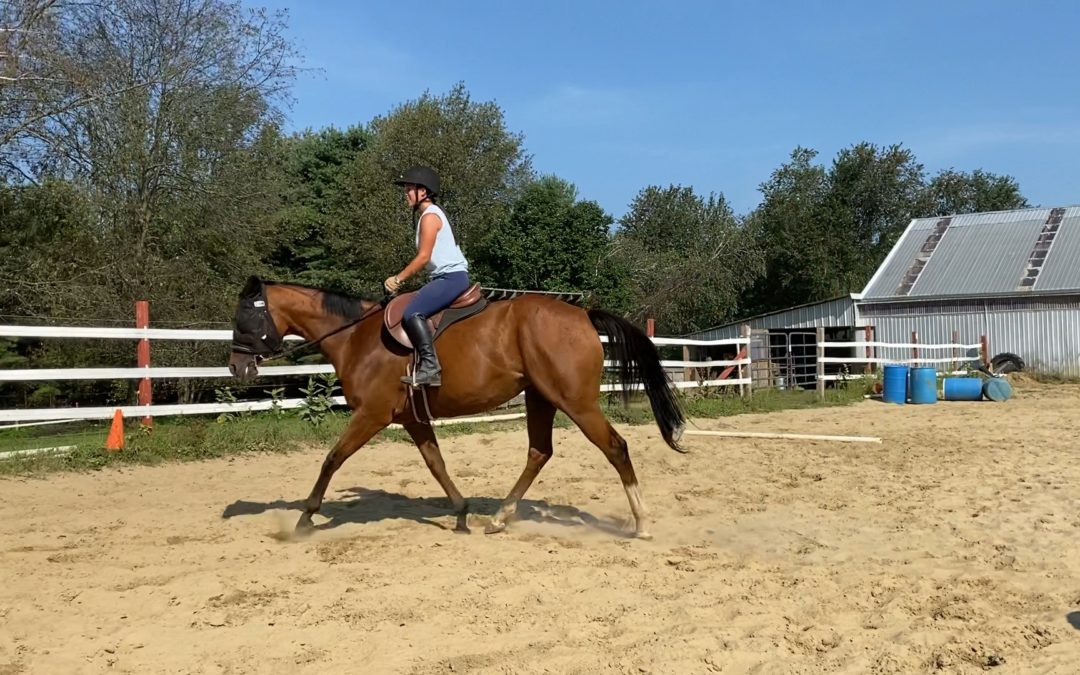As I swung my leg over her back she started backing up and threatening to buck. Her back was humped up and her mind was thinking backward and up. She was not accepting and softly standing to be mounted. Even though she had pulled up easily to the mounting block her mind wasn’t acting like a partner, she was playing dominance games with me.
When training a horse there are a lot of “tasks” that need to be trained: stand still to be tacked and mounted, go forward, turn left and right, slow down, and stop are just a few of the basic tasks. When training these tasks it’s important to remember to also train the mind and prioritize the behavior over the task.
I was reminded of this recently when I was training my young mare Paris to pull up to the mounting block to be mounted. She was willingly getting in the correct position, but once I was on her back she began the dominance games. Instead of going forward, she’d go backward and up. At first, I thought the behavior must be because of physical discomfort or pain. After I ruled that out the negative behavior was still there, even though the “task” of pulling up to and standing still at the mounting block was excellent. Once I decided to treat the backing up and bucking as a dominance game and a lack of responsiveness to going forward, everything changed, for the better! I made sure I could move her forward at the trot while I stood on the mounting block. Guess what!? At first, I could not move her forward willingly while I stood on the mounting block. She would meander around and even bump into me, almost knocking me off the mounting block. I had been hesitant to get after her to move and trot around me while I stood on the mounting block because I didn’t want to discourage her from pulling up to the mounting block. I had prioritized the task instead of the behavior. The behavior I needed was more responsiveness to going forward.
Since addressing this issue I’ve had the best rides I’ve ever had on this horse. The most important thing when training a horse is the state of their mind. Because I won the “dominance game” of being resistant to going forward Paris tested me less during the actual ride.
I know that I’ll be presented with many more opportunities to train the mind instead of the task, and I’m ready! I’ll be looking for the behaviors and for the mind to be with me. This was just one example of a behavior that needed to be trained, but there are many different positive behaviors and qualities your horse should have: connection, relaxation, responsiveness, confidence, impulsion, bending, harmony, agility, purpose, and power to name a few.
I encourage you to evaluate your training plan and determine which behaviors and qualities you need to prioritize to accomplish the task. Train the behavior you want. The task will come as a result of the appropriate behavior.


This is very interesting. A new angle for me to think of. I look forward to our group class on Monday to further investigate the task, the behavior, the state of mind, and the appropriate “fix”!
It is interesting! Thinking about the behavior and the state of mind vs. the task can completely transform the way a person interacts with horses!
Interesting. I have had many breakthroughs at the mounting block! As you know 😆 Lila can play dominance games sometimes too. Something new to experiment with.
Yes, you have! When you first started your journey with Lila she had a lot of unconfidence and fear surrounding the mounting block. Now she’s confident and likes to play dominance games sometimes. I saw a change in her expression during your last lesson when you focused on getting a better quality yield from the mounting block. Keep up the good work! Be diligent with observing and responding to the mind 🙂